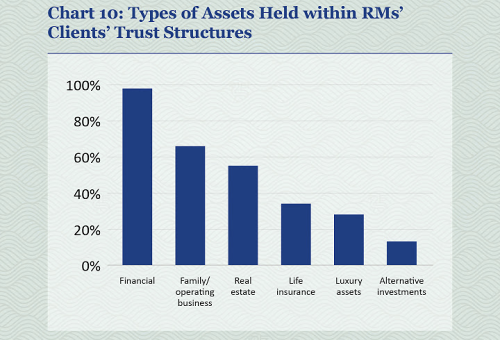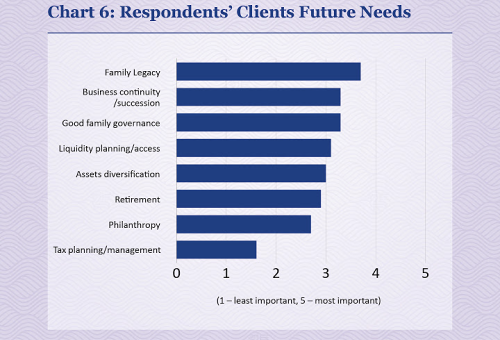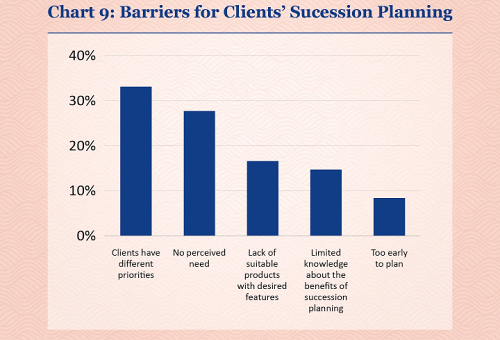What COVID-19 Has Taught Us About Wealth And Succession Planning
Health is wealth – it’s a familiar saying that has, until recently, nonchalantly tripped off the tongue, Butterfield Group's Brian Balleine writes.
Brian Balleine is Regional Head Asia at Butterfield (Singapore) Pte. Limited (Butterfield), based in Singapore.
Under the cloud of the current Covid-19 global pandemic, the throwaway phrase has now taken on a new significance. And the substance contained in the words is resonating anew across generations.
Against the backdrop of the incontestable collapse of global financial markets and the disturbing coronavirus health crisis, wealthy families in Asia could be provoked into prioritizing the establishment of basic financial foundations to secure and transfer their hard-won financial legacy.
Significant Gap
While Asian entrepreneurs and business families have been brilliantly adept at creating wealth, the attention paid to preserving that wealth and preparing to pass it on to children or beneficiaries still lags behind the global curve.
A recent report by Butterfield highlighted a significant gap. Asia is now home to the majority of the world’s billionaires and the fastest-growing region of wealth in the world. But according to the survey, just over 40 percent of relationship managers, working with high net worth individuals and wealthy families, said their clients have enacted a succession plan or are actively planning for succession.
When asked why, 31 percent of respondents noted that clients «have different priorities,» while 28 percent said they saw «no perceived need» for succession planning. Times though have changed since the survey was commissioned, and that perceived need is now perhaps in focus.
Unforeseen Circumstances
Through no fault of the individual or family, decades of hard-won wealth can disappear overnight. As the world turned to face 2020 with cautious optimism, for most the global financial crisis of 2008/9 had become a distant memory, not believed likely to erupt again any time soon.
However, when it comes to protecting one’s family wealth and assets, it pays to be dispassionate and safeguard them from over emotional knee-jerk influences.
Make an Early Start
So when is the best time to set up a succession plan? Even without the dreadful events enveloping the world, as soon as possible is the answer.
From the outside, it may look overwhelmingly complicated and legally intimidating, but securing the financial foundation for the next generations as early as possible is a sensible step and one that can be done without large amounts of overbearing bureaucracy. And while each family will have unique factors to consider when planning how to structure their assets, these can be fine-tuned as the family grows.
More complicated structures can be developed once the fundamentals have been established. The family may wish to ring-fence money for the education of their children or even grandchildren, or perhaps safeguard the family home from the potential business failure.
The Role of Trust
This is where trusts come into the picture. A trust is used to protect and preserve family wealth and represents a multi-faceted solution to many of the intractable problems faced by those who are still on the fence about the preservation of their wealth.
At its core, a trust is a separation of the legal and beneficial ownership of an asset. This is important for family businesses, which often need to consider the widened family ownership and the governance of the business by incorporating a management structure that is distinct from ownership.
Multiple Asset Class
In establishing a trust, families are not constrained by anything other than the fundamental trust principles in law. This flexibility allows trust partners to tailor their solutions to the specifications of the family, no matter how complex they are. Trusts can also hold multiple asset classes, an important consideration in this day and age where families increasingly own non-financial or lifestyle assets.
And modern Asian business families are more likely to have developed international businesses, it is essential to scope out a trust partner that can advise the family from a multi-jurisdictional perspective.
Popular Solution
In the same survey by Butterfield, trusts are seen to be a popular solution for many relationship managers, with more than half (57 percent) of them having more than 50 percent of clients who use trusts as part of their succession plan.
Avoiding the impact of external risks such as COVID-19 seems unlikely at the moment, but what it can teach us is that the consequences of not planning, last-minute planning, or bad planning could be disastrous.
A family could risk losing its wealth or see the ownership of a business taken out of its hands in the blink of an eye. Understanding the strengths and benefits of a trust structure could prove to be of paramount importance to a family, and they would be advised to start planning sooner rather than later.
Brian Balleine is Regional Head Asia at Butterfield (Singapore) Pte. Limited. He has over 30 years of experience in the field of international wealth planning as well as trust and fiduciary administration. He has worked extensively with ultra-high net worth families and their advisors to establish complex wealth planning solutions. He has spent the last 18 years leading and managing trust businesses in Asia, Europe, and the Caribbean. In addition to his Master of Business Administration Degree, he is a Chartered Fellow of the Chartered Institute for Securities and Investment. He is also a member of the Society of Trust and Estate Practitioners.















